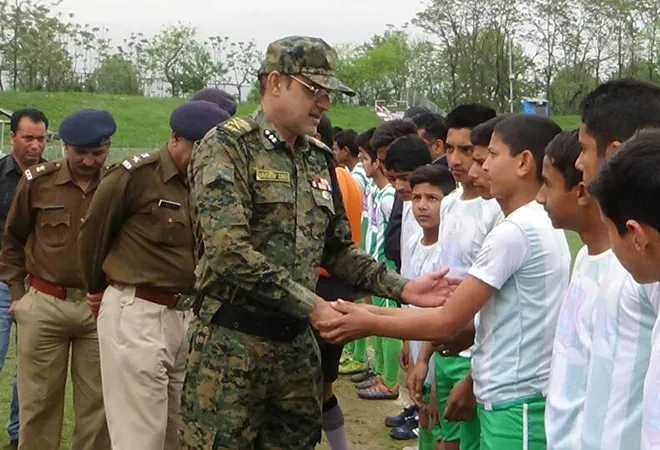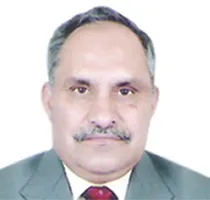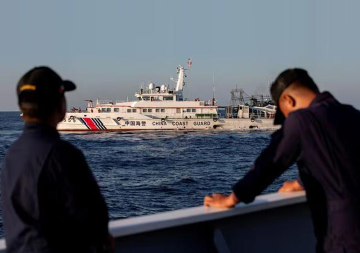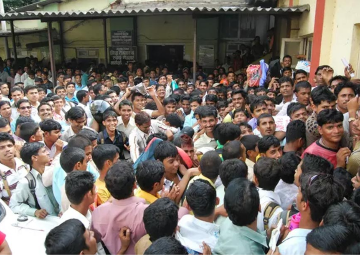The video of a CRPF personnel being roughed up and abused by mobs in the valley is only a superficial symptom of a larger malaise within that organisation. Reasons for this state of affairs are too well known to bear repetition. The government will do well to take urgent steps.
The viral video of the hapless Central Reserve Police Force (CRPF) constable being outrageously assaulted and bullied by some Kashmiri youth while escorting polling booth staff and EVM's, is not only condemnable but also disconcerting. It is bound to raise hackles of the average law-abiding citizen and of uniformed personnel everywhere. That human rights' advocates and the liberal lobby, that wastes little time in accusing the security establishment of gross violations at the drop of a hat, was deafeningly silent is another matter. They obviously believe that our men in uniform do not deserve to be treated by the same yardstick as those who violently oppose our Constitutional freedoms.
This was clearly evident from the vociferous protests that erupted the moment a video, showing an Army column moving through the streets with a stone-pelter tied to the front of the leading vehicle, came into the public domain. The fact that this video was wholly slanted, and did not bring the complete picture, was only expected and the Army wasted little time in clarifying the issue.
While the Army accepted the video to be correct, it also brought out that it was an innovative approach taken by the commander of the Quick Reaction Team (QRT), who arrested and used a stone-pelter to avoid being attacked themselves. This was resorted to while rescuing and evacuating an Indo Tibetan Border Police (ITBP) section on poll duty that had been illegally held hostage by an unruly mob that threatened to lynch them.
Both these contrasting actions show the predicament in which the security forces find themselves in the valley. Notwithstanding the fact that the CRPF top brass may want to give a different spin to the matter and suggest that it reflects the constable's 'restraint' and commitment to his task, the fact of the matter is that it was a clear case of command failure at all levels. This section too should have occupied a defensive perimeter and waited for a QRT to come to its assistance.
The CRPF brass must not be allowed to obfuscate and get away by changing the narrative. They must be held accountable for their command failure which is bound to give jihadi groups and their supporters' ample cause for cheer. Instead of permitting senior officers to come on TV to justify their inactions, the Ministry of Home Affairs would do well to summarily remove from command those responsible for this fiasco.
It's a given that, if a policeman is not in a position to defend himself, he can hardly be expected to either uphold the law or protect those in his charge. As a matter of fact, a more appropriate word in lieu of restraint, that describes the actions of this constable and his colleagues, would be 'capitulation'. It not only showed up poor training but cowardice as well and reflects how badly the hierarchy let down its rank and file.
All subsequent actions, such as filing complaints with the local police, are of little consequence and cannot, in any way, hide the stark truth or help the CRPF hierarchy cover their own misdemeanours. One can only imagine the adverse impact this incident will have on the psyche and morale of the average CRPF constable.
This brings us to the larger issue of why the Srinagar Parliamentary constituency saw such an abysmally low voter turnout of 7.13 per cent in the by-poll conducted recently? While some of the blame can be attributed to the instability that has gained traction in the valley, that has led to increasing incidents of violent protests, it cannot be the only reason.
In the 2014 elections for this seat, the Peoples Democratic Party (PDP) candidate, who subsequently resigned in protest in 2016, Tariq Karra, polled 1.5 lakh votes while his nearest rival, National Conference (NC) president, Farooq Abdullah had polled 1.15 lakh votes.
Interestingly, in the 2009 elections for this seat, while Abdullah polled nearly 1.47 lakh votes, the PDP polled 1.16 lakh votes. It would then be fair to conclude that both the major parties have around a lakh each of staunch loyalists, who vote for them regardless, while another 50,000 odd voters swing one way or the other. This incidentally, represents only about one-fourth of the total electorate, which is around 11 lakh. Since once again, both the PDP and the NC decided to field candidates, it was to be expected that the two-and-a-half lakh committed loyalists to have come out in force as all were aware of the advantages that accrue to supporters of the winning candidate. In such circumstances, one can only conclude that these voters were either coerced or deterred from casting their votes by the jihadi lobby.
Ever since the mid-1990s, the responsibility for counter-insurgency operations in the bigger towns and cities of the Kashmir valley, including Srinagar, rests with the Central Armed Police Forces, primarily the CRPF, while that for the border towns and in rural areas is with the Army. This requires them to ensure that the security situation within their respective areas of responsibility is conducive for the conduct of polls. Obviously, their success or otherwise, is clearly defined by the poll percentages obtained in that area.
In the present instance, therefore, one can conclude that whichever organisation was responsible for controlling the security environment of Srinagar and its environs has obviously been sleeping on the job. If, as I suspect, it is the CRPF, then the incident involving the harassment of the constable is only a superficial symptom of a larger malaise within that organisation. Reasons for this state of affairs are too well-known to bear repetition and the government would do well to take urgent steps in this regard.
Finally, while the CRPF hierarchy may be responsible, to a degree for the situation having reached the state it has, the fact is that other institutions of State, such as the Government and the Legislative bodies, both at the Centre and State, along with the Supreme Court and some elements of the Fourth Estate, are equally responsible, if not more so, for deterioration of the security environment, especially the lack of any respect for the law displayed by the stone-pelters and other jihadi supporters.
There can be little doubt that lack of clear direction from the government on how it intends to proceed forward to achieve a political settlement and what it expects the security forces to do to help achieve this, is completely absent. The political establishment has, thus, created a vacuum that ensures the top hierarchy in the security establishment finds itself at a loss as to how it should respond to the unfurling situation. Thus, we have two contrasting responses by those at the ground level.
Political opportunism and attempts to play to the gallery using jihadi rhetoric, especially on the part of the Opposition and elements in the media, hardly helps matters. Finally, the apex court, with its short-sighted rulings on the issue of Armed Forces (Special Powers) Acts, and its interference in the manner in which operations may be conducted and the type of weapons may be used, have confused the security forces. They are unsure of the legal consequences that their operational conduct may attract subsequently. They prefer to err towards inaction, which has greatly emboldened those opposed to working within the Indian Constitution and their supporters.
They believe that they can spin any story to their advantage as the courts have shown, time and again, that they have little faith in our security forces. To shackle our forces, and then expect them to produce results, is unjust and can only result in further deterioration of the ground situation. It is time that our Constitutional authorities woke up to their responsibilities and gave our forces a level-playing field, that's all they ask for.
This commentary originally appeared in The Pioneer.
The views expressed above belong to the author(s). ORF research and analyses now available on Telegram! Click here to access our curated content — blogs, longforms and interviews.




 PREV
PREV


